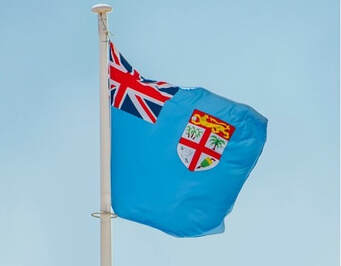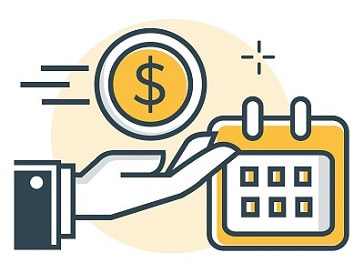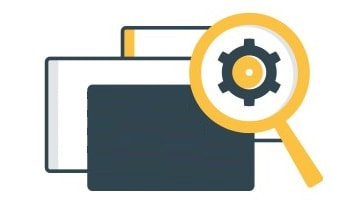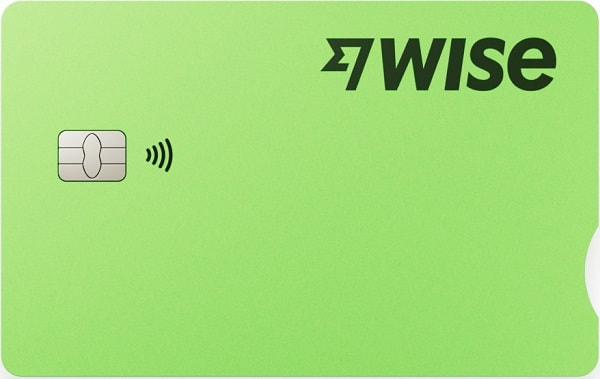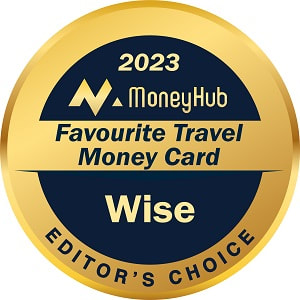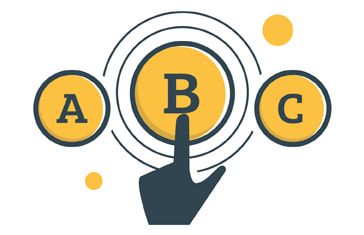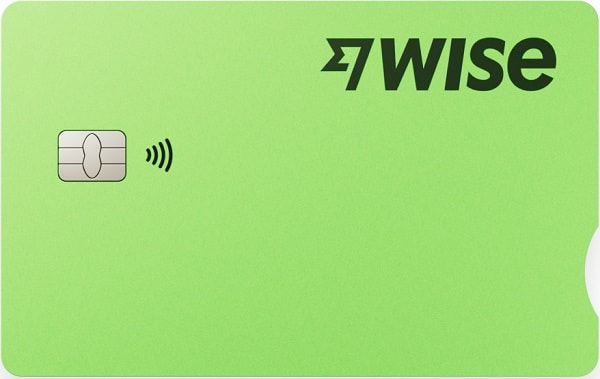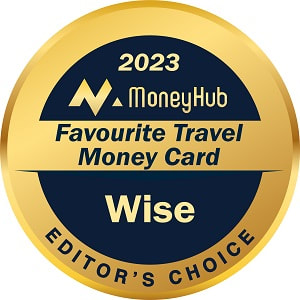Fiji Travel Money - Best Options for Kiwis 2024
Our guide outlines everything you need to know about spending money in Fiji, specifically cash vs debit and credit cards vs travel money cards.
Updated 3 January 2024
Summary:
Our guide explains everything you need to know to make travelling in Fiji a cost-effective experience. We cover:
Advertising disclosure: We may receive a payment if you sign up for a card via MoneyHub - please read our advertising policy for more details.
Related guide: The Best Travel Money Cards
Video Overview: In the video below, MoneyHub Founder outlines our guide to best explain must-know facts and how to avoid the traps of forex when you're in Fiji.
- Fiji is a popular year-round with New Zealanders, but the most cost-effective way to pay in Fiji Dollars (FJD) is not obvious.
- The official currency of Fiji is the Fijian Dollar, often represented as FJD or with the "$" symbol locally. Over the past year, the exchange rate for NZD to FJD has seen some fluctuations, but on average, 1 NZD hovers between 1.30 and 1.40 FJD.
- While many New Zealanders stay in hotels and resorts, having the most economical and convenient payment method for Fiji makes every dollar go further.
- We suggest having an emergency fund of around NZ$200 in cash which you can exchange for FJD should you urgently need money - it's unlikely you will use it, but it's a good backup option.
Our guide explains everything you need to know to make travelling in Fiji a cost-effective experience. We cover:
- Option 1 - Using Cash in Fiji
- Option 2 - Using NZ-Issued Debit and Credit Cards in Fiji
- Option 3 - Using Travel Money Cards (Including the Wise Debit Card) in Fiji
- Must-Know Facts for Using Money in Fiji
- NZD to FJD Conversion and Spending FJD - Frequently Asked Questions
- Our Conclusion
Advertising disclosure: We may receive a payment if you sign up for a card via MoneyHub - please read our advertising policy for more details.
Related guide: The Best Travel Money Cards
Video Overview: In the video below, MoneyHub Founder outlines our guide to best explain must-know facts and how to avoid the traps of forex when you're in Fiji.
Option 1 - Using Cash in Fiji
If you want physical FJD notes before leaving New Zealand for Fiji, you have a couple of options:
Getting FJD Cash from an NZ Bank: Most NZ banks have stopped offering FX cash services; Westpac is currently the only provider, but you'll need to be an existing Westpac customer to swap NZD for FJD notes.
Getting FJD Cash from a Beaurau de Change/Forex Booth:
The primary operators are travel money booths like Travelex and No1 Currency. However, the FX rates are well below mid-market rates per our research below, meaning you'll get less FJD for your NZD than you otherwise would if you used Westpac's services or withdrew FJD from an ATM once you're in Fiji.
Getting FJD Cash When You Arrive in Fiji:
If you want to have physical Fiji Dollars on hand for your arrival at Nadi Airport, Westpac offers two ATMs in the arrivals areas per Fiji Airports Group's guidance. One ATM is by the bag collection. The other ATM is in the general public arrivals area, where you'll find shuttle collections, rental cars and other services. The ATMs in Nadi airport (and all over Fiji) may charge your bank a fee to withdraw; your bank then charges you a fee, as outlined in our Debit and Credit Card FX Fees guide. ANZ also has a network of ATMs across Fiji depicted in this map, and Westpac publishes a list here.
If you bring NZD in your wallet, you can change NZD to FJD at any forex booth at Nadi Airport (and around Fiji).
Our View: We've found that the FX rates at Forex booths aren't as favourable as those offered by Westpac. Furthermore, Westpac's rates aren't as good as those from Wise. In practical terms, if you use Wise to withdraw money from an ATM in Fiji, you'll get an extra FJ$10 for every NZ$100 you take out (compared to changing it with the FX booths), thanks to Wise's superior rates and lower fees.
Bonus: The Wise Debit Card offers withdrawals of up to NZ$350 per month without charging a transaction fee, meaning you can withdraw up to around FJD 470 in cash without paying FX transaction fees (after NZ$350, it's a flat 1.75% fee). However, some ATMs may charge a fee to use their service - if this happens, you'll usually be charged around NZ$1 to NZ$5 per ATM withdrawal.
Know This: If you make a one-off withdrawal of say, the equivalent of NZ$1,000 while outside of New Zealand, Wise will charge you fees on the $650 whereas the first $350 per month is free.
Video Comparison: In the video below, MoneyHub Founder compares the NZD:FJD rates offered by forex kiosks Travelex and No1 Currency, and how they compare to Wise and bank cards that use Visa and Mastercard:
Getting FJD Cash from an NZ Bank: Most NZ banks have stopped offering FX cash services; Westpac is currently the only provider, but you'll need to be an existing Westpac customer to swap NZD for FJD notes.
Getting FJD Cash from a Beaurau de Change/Forex Booth:
The primary operators are travel money booths like Travelex and No1 Currency. However, the FX rates are well below mid-market rates per our research below, meaning you'll get less FJD for your NZD than you otherwise would if you used Westpac's services or withdrew FJD from an ATM once you're in Fiji.
Getting FJD Cash When You Arrive in Fiji:
If you want to have physical Fiji Dollars on hand for your arrival at Nadi Airport, Westpac offers two ATMs in the arrivals areas per Fiji Airports Group's guidance. One ATM is by the bag collection. The other ATM is in the general public arrivals area, where you'll find shuttle collections, rental cars and other services. The ATMs in Nadi airport (and all over Fiji) may charge your bank a fee to withdraw; your bank then charges you a fee, as outlined in our Debit and Credit Card FX Fees guide. ANZ also has a network of ATMs across Fiji depicted in this map, and Westpac publishes a list here.
If you bring NZD in your wallet, you can change NZD to FJD at any forex booth at Nadi Airport (and around Fiji).
Our View: We've found that the FX rates at Forex booths aren't as favourable as those offered by Westpac. Furthermore, Westpac's rates aren't as good as those from Wise. In practical terms, if you use Wise to withdraw money from an ATM in Fiji, you'll get an extra FJ$10 for every NZ$100 you take out (compared to changing it with the FX booths), thanks to Wise's superior rates and lower fees.
Bonus: The Wise Debit Card offers withdrawals of up to NZ$350 per month without charging a transaction fee, meaning you can withdraw up to around FJD 470 in cash without paying FX transaction fees (after NZ$350, it's a flat 1.75% fee). However, some ATMs may charge a fee to use their service - if this happens, you'll usually be charged around NZ$1 to NZ$5 per ATM withdrawal.
Know This: If you make a one-off withdrawal of say, the equivalent of NZ$1,000 while outside of New Zealand, Wise will charge you fees on the $650 whereas the first $350 per month is free.
Video Comparison: In the video below, MoneyHub Founder compares the NZD:FJD rates offered by forex kiosks Travelex and No1 Currency, and how they compare to Wise and bank cards that use Visa and Mastercard:
Using FJD Cash - Pros and Cons
Pros:
Cons:
- Universal Acceptance: Cash is king no matter where you go in Fiji. Especially when shopping at local markets, taking buses, or visiting remote places. Your debit or credit cards won't help much when you're out of the resorts and buying locally.
- Immediate Transactions: There's no risk of card machine issues, declined transactions or fraud on your card.
Cons:
- Safety Concerns: Carrying large amounts poses a risk, especially in crowded areas. However, you can always leave a portion of FJD in a hotel room safe or keep it somewhere secure on you.
- Airport Exchange Woes: While convenient, exchanging NZD to FJD at the airport can be costly if you use a high-fee debit card at an ATM or get a bad rate at the Forex kiosk in New Zealand or Fiji. This is because rates are often marked up, and there might be hidden commission fees, reducing the amount of FJD you receive for every NZD you change.
If I have spare Fiji Dollars on the last day I'm on Fiji, what should I do with them?
- Spare notes and coins have a habit of gathering dust back in New Zealand, and it may be some time before you visit Fiji again. The best way to avoid having leftover currency is to spend the notes and coins on your last day; many people make a part payment alongside their card to settle a final bill, for example a lunch or dinner, before they fly out. Or you can put the cash towards the hotel bill if you're settling the bill at the end of your stay.
- You can convert them back to NZD at Nadi Airport or when you return to New Zealand. The FJD/NZD rate isn't likely to be market-leading at an FX kiosk. However, having NZD you can spend is more useful than FJD notes that sit there, so it's a cost worth incurring.
- Lastly, if you know someone visiting Fiji in the future, giving them FJD notes and coins makes for a nice present they'll appreciate.
Option 2 - Using NZ-Issued Debit and Credit Cards in Fiji
Most New Zealanders will use a debit and/or credit card at some stage when in Fiji. However, many charge fees and may not always be accepted.
What Do New Zealand Banks Charge for Card Use? Most banks impose foreign transaction fees ranging from 0% to 3.5% of the total transaction amount. This fee is atop the exchange rate margin the bank adds to the daily exchange rate. Some banks might also charge a flat fee for overseas ATM withdrawals.
For example, if you're using an ANZ Visa Debit or credit card, you'd typically incur a fee of 1.30% of the transaction amount when you make a purchase overseas per the ANZ's website. If you withdraw from an ATM, you might also pay an additional overseas ATM fee. Detailed bank charges are in our Debit and Credit Cards FX Fee comparison.
What Do New Zealand Banks Charge for Card Use? Most banks impose foreign transaction fees ranging from 0% to 3.5% of the total transaction amount. This fee is atop the exchange rate margin the bank adds to the daily exchange rate. Some banks might also charge a flat fee for overseas ATM withdrawals.
For example, if you're using an ANZ Visa Debit or credit card, you'd typically incur a fee of 1.30% of the transaction amount when you make a purchase overseas per the ANZ's website. If you withdraw from an ATM, you might also pay an additional overseas ATM fee. Detailed bank charges are in our Debit and Credit Cards FX Fee comparison.
Using NZ Bank Cards - Pros and Cons
Pros:
Cons:
Our View:
Related guide: The Best Travel Money Cards
- Convenience: Your NZ debit or credit card is versatile. Whether booking tours, paying for hotel stays, or dining out, the card covers you (where cards are accepted).
- Backup Plan: If you ever need to make a payment, having your debit or credit card will provide you with the flexibility of access to funds beyond what you might carry in cash.
- Tracking: One underrated advantage is the ability to track your expenses. With mobile banking apps, you can keep tabs on your spending, set budgets, and even receive instant transaction alerts.
Cons:
- Unpleasant Surprises: The cost of convenience can be high. The combined effect of foreign transaction fees and the bank's exchange rate margin can result in you paying significantly more than expected. Make sure you know the fees you'll be charged by reading your bank's website - our summary of overseas debit and credit card fees explains more.
- Dynamic Currency Conversion (DCC) Pitfalls: Sometimes you are offered to pay in NZD instead of FJD at card terminals in Fiji, it might seem tempting, but this service, called DCC, can result in higher costs as the provider takes a margin, and the exchange rates used are often less favourable, and there might be hidden fees as well. When you agree to pay in FJD, you'll always get the bank or travel money card's best FX rate.
- Cards are Not Always Welcome: If your itinerary includes less-touristy parts of Fiji or you wish to immerse in local experiences, remember that many local businesses, especially in remote areas, might not accept cards. It's always best to mix payment methods and be aware that even if debit cards are accepted, credit cards may not.
- Potential Card Issues: There's always a risk of your card being declined, skimmed, or even captured by ATMs. While these issues are rare, a backup card or cash is good.
Our View:
- While using a New Zealand bank debit or credit card in Fiji offers undeniable convenience, it has its share of pitfalls. Many New Zealanders carry a mix of cash (preferably withdrawn using a cost-effective method like Wise) and a bank card to ensure they're covered for all situations.
- Please double-check the fees associated with your specific bank and consider alternative options like travel-specific or multi-currency cards that offer better rates and fewer fees.
Related guide: The Best Travel Money Cards
Option 3 - Using Travel Money Cards (Including the Wise Debit Card) in Fiji
Know This First: Our review and comparison of travel money cards confirms Wise as the best option, with no card a close second. This includes options from Travelex, OneSmart and Cash Passport. For this reason, we've focused on Wise for this section to explain what you need to know.
Getting Familiar with the Wise Debit Card Usage in Fiji
Wise offers a travel money card that lets you have multiple currency wallets and comes with a physical and digital debit card. However, while you can't buy FJD in advance and store them in an FJD digital wallet, you can top up NZD using your bank account and use the Wise Debit Card in Fiji - transactions are converted into NZD and deducted from your balance.
What Does Wise Charge for Card Use? Wise prides itself on transparent fees and real exchange rates. They charge a small conversion fee when you convert your money to FJD, which is typically much lower than traditional banks, with the additional benefit of leading FX rates.
ATM withdrawals are free up to a certain limit (NZ$350 per month), after which a 1.75% fee is applied.
Getting Familiar with the Wise Debit Card Usage in Fiji
Wise offers a travel money card that lets you have multiple currency wallets and comes with a physical and digital debit card. However, while you can't buy FJD in advance and store them in an FJD digital wallet, you can top up NZD using your bank account and use the Wise Debit Card in Fiji - transactions are converted into NZD and deducted from your balance.
What Does Wise Charge for Card Use? Wise prides itself on transparent fees and real exchange rates. They charge a small conversion fee when you convert your money to FJD, which is typically much lower than traditional banks, with the additional benefit of leading FX rates.
ATM withdrawals are free up to a certain limit (NZ$350 per month), after which a 1.75% fee is applied.
Using the Wise Debit Card - Pros and Cons
Pros:
Cons:
Our View: The Wise debit card, with its transparent fee structure and competitive exchange rates, is a value-delivering choice for many travellers in Fiji. Combining the card with some cash will ensure you're prepared for all situations, and with zero FX fees on withdrawals up to NZ$350 per month (around FJ$470), the card delivers on value.
Related guide: The Best Travel Money Cards
- Competitive Rates: Wise uses the real exchange rate (the one you see on Google) and thus avoids the typical markup that banks add.
- Multi-currency: The Wise borderless account lets you hold and manage money in multiple currencies (excluding FJD), which can be extremely useful when travelling to more than just Fiji.
- Transparent Fees: You always know what you're being charged, with no hidden costs.
- Instant Notifications: The Wise app notifies you immediately after every transaction, helping you keep track of your spending.
Cons:
- ATM Withdrawal Limit: While they offer free ATM withdrawals, it's only up to a certain limit. Beyond that, there's a 1.75% fee.
- Not a Credit Card: The Wise card is a debit card, meaning you can't spend money you don't have - we argue this is also a positive feature to avoid holiday debt.
- Acceptance: While widely accepted (alongside any other Visa or Mastercard), there might still be some places in Fiji where the Wise card isn't accepted. Given Fiji's cash-based economy, it's always best to have some cash as a backup.
Our View: The Wise debit card, with its transparent fee structure and competitive exchange rates, is a value-delivering choice for many travellers in Fiji. Combining the card with some cash will ensure you're prepared for all situations, and with zero FX fees on withdrawals up to NZ$350 per month (around FJ$470), the card delivers on value.
Related guide: The Best Travel Money Cards
Our Top-Rated Travel Money Card - The Wise Debit Card
|
Must-Know Tips for Using Money in Fiji
There are lots of ATMs in major tourist areas and within hotels and resorts
Most major towns, popular tourist spots, resorts, and hotels in Fiji are equipped with ATMs. However, ATMs might become scarce if you plan on going to less visited towns and areas. To help you plan, be aware of the following:
- Withdrawal Limits: Most ATMs in Fiji have a maximum withdrawal limit. Depending on the bank and location, this could range from FJD 500 to FJD 2,000. Remember, multiple withdrawals can attract additional fees (because you are charged per transaction).
- ATM Fees: Some local Fijian banks might charge a fee for foreign card withdrawals, which is then passed to your bank and on to you. It's good practice to check the ATM for any fee disclosures before proceeding.
Tipping isn't common in Fiji
Tipping isn't a widespread custom in Fiji. Unlike many Western countries, it's not expected. However, gestures of appreciation are always welcome.
How Much to Tip: While there's no hard and fast rule, if you've experienced exceptional service, consider leaving a 5-10% tip. An FJD 1-2 coin can be a kind gesture for smaller services like bag handling.
Where to Tip: In some resorts or establishments, a collective tipping system might be in place, where gratuities are shared among staff. It's always a good idea to inquire.
How Much to Tip: While there's no hard and fast rule, if you've experienced exceptional service, consider leaving a 5-10% tip. An FJD 1-2 coin can be a kind gesture for smaller services like bag handling.
Where to Tip: In some resorts or establishments, a collective tipping system might be in place, where gratuities are shared among staff. It's always a good idea to inquire.
Protect Your Cards, Cash and Stay Safe
Split your cash and cards. Don't carry everything in one wallet. Instead, leave some backup funds in your accommodation's safe or secure place.
- Transactions: Ensure you keep an eye on your card during transactions to avoid card skimming or cloning. It's a universal travel tip, and Fiji is no exception.
- Vigilance: While Fiji is relatively safe, always be cautious of unsolicited offers or deals that sound too good. Trust your gut and steer clear if something feels off.
Cash is King in Local Settings
Debit and credit cards won't be accepted everywhere - Fiji is very different to New Zealand, and cash underpins the local economy. This applies to visiting local markets, villages, or small eateries; cash will be your primary mode of payment. It's a good practice to carry small denominations to facilitate easier transactions.
Fiji has a VAT (GST) Refund Scheme
The Tourist VAT Refund Scheme (TVRS) allows tourists aged 13 and over to reclaim the 9% VAT on specific goods bought in Fiji. Claims can be made at major airports and certain cruise departure points. A minimum spend of FJ$500 at approved retailers is required, and purchased items must remain unused before leaving Fiji. If eligible, you'll receive a payment voucher after customs verification, which can be exchanged for the refund at specified bank counters.
More details are outlined on the Fiji Government Tax Department's Website and PDF. Please be aware that the process can be slow and arduous, so you'll need to arrive at the airport early to complete the forms and process.
More details are outlined on the Fiji Government Tax Department's Website and PDF. Please be aware that the process can be slow and arduous, so you'll need to arrive at the airport early to complete the forms and process.
NZD to FJD Conversion and Spending FJD - Frequently Asked Questions
How does the NZD usually fare against the FJD?
The NZD-FJD exchange rate can fluctuate based on economic factors. Since 2010, 1 NZD has been worth more than 1 FJD - 1.30 to 1.40 is a historical range. You can check the live rate here.
Can I use my travel money card, NZ debit card or credit card everywhere in Fiji?
Most established businesses, hotels, and resorts accept debit and credit cards. However, in remote areas or local markets, cash is preferred.
Is Fiji expensive for NZ tourists?
Fiji can be as affordable or as luxurious as you want. While resort stays can be pricier, local eateries, transportation, and activities can be quite budget-friendly for New Zealanders.
What's the best way to get the most FJD for my NZD?
Services like Wise can offer better exchange rates than traditional banks or airport exchange counters. The rates are better, the fees are lower, and there's an app to track all spending so you know exactly what you paid for something.
Are there any restrictions on how much money I can bring into Fiji?
You can bring up to FJD 10,000 or its equivalent in foreign currency without declaring it per the Fiji Government's website. Amounts exceeding this must be declared upon arrival.
What's the most common payment method for local transportation in Fiji?
Cash is the most common mode of payment for buses, taxis, or other local transportation. Some taxi operators might have card machines, but it's not guaranteed.
Our Conclusion
For New Zealanders travelling to Fiji, understanding the most economical ways to access and spend Fijian Dollars (FJD) is crucial to ensure a hassle-free and cost-effective journey. While the exchange rates fluctuates against the NZD, one NZ dollar usually converts to 1.30 to 1.40 Fiji Dollars.
Regarding the means of accessing FJD:
Our View: A balanced approach combining Wise's transparent offerings with a moderate amount of cash (withdrawn from an ATM when in Fiji) appears to be the most favourable strategy for New Zealanders visiting Fiji. It offers flexibility, competitive rates, and preparedness for all spending scenarios.
Regarding the means of accessing FJD:
- Cash: Although universally accepted, especially in remote areas, obtaining cash can be expensive unless you do it right. Exchanging NZD at Nadi or Auckland airport Forex kiosks might seem convenient, but their FX rates are less competitive than those of banks like Westpac. The Wise Debit Card stands out, offering better rates and allowing monthly withdrawals without transaction fees of up to NZ$350.
- NZ Bank Cards: These cards offer the convenience of widespread acceptance in tourist-centric establishments in Fiji. However, their use might attract multiple fees like foreign transaction fees, daily exchange rate margins, and potential overseas ATM withdrawal charges. It is essential to be aware of Dynamic Currency Conversion (DCC) and actively try to avoid it, given it locks in less favourable exchange rates.
- Wise Debit Card: The Wise Debit Card is a transparent, multi-currency solution with competitive exchange rates and minimal fees. However you should also consider keeping some cash on hand due to Fiji's cash-dominant economy. With your Wise card you can withdraw up to NZ$350 per month without paying FX conversion fees.
Our View: A balanced approach combining Wise's transparent offerings with a moderate amount of cash (withdrawn from an ATM when in Fiji) appears to be the most favourable strategy for New Zealanders visiting Fiji. It offers flexibility, competitive rates, and preparedness for all spending scenarios.
Our Top-Rated Travel Money Card - The Wise Debit Card
|
Related Guides:
Country-Specific Travel Money Guides:
- Compare Travel Money Cards
- Travelex Money Card vs Wise Debit Card
- Wise Debit Card vs Cash Passport Travel Money Card
- Wise Debit Card vs Air New Zealand OneSmart Travel Money Card
- Wise Debit Card Review
- Foreign Currency Debit and Credit Card Fees
- Foreign Currency Exchange
- Compare Travel Insurance
Country-Specific Travel Money Guides:

